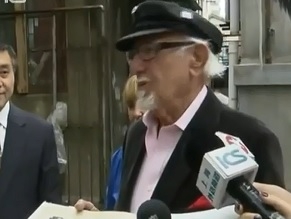|
World Jewish News

Gary Matzdorff’s May visit to China didn’t turn up his old crush, but it did generate lots of local media interest. (YouTube)
|
Holocaust refugee seeks long-lost love in Shanghai
03.09.2013, Holocaust A 92-year-old Holocaust survivor’s search for a long-lost love in Shanghai has captured the imagination of China’s romantics. News stories continue to appear there about Gary Matzdorff’s May trip to China’s second-biggest city from his home in Granada Hills, Calif., hoping to find a Chinese woman he almost married — had she not dumped him and run off with an American sailor.
Matzdorff, whose testimony has been recorded by the Shoah Foundation, arrived in Shanghai in 1938 as a German refugee fleeing the Nazi regime. He was 18 when he left Berlin with his parents and grandmother. His paternal grandparents were murdered in concentration camps.
The family settled in Shanghai’s Hongkou district, a one-square-mile area designated as the “Restricted Sector for Stateless Refugees” in 1943 by the occupying Japanese. Approximately 23,000 European Jewish refugees lived in the area, known colloquially as the Shanghai Ghetto.
At the request of The Times of Israel, Irene Eber, an emeritus Hebrew University professor and expert on Jews and China, searched for evidence of the Matzdorff family in Shanghai. She found Matzdorff’s father, Herbert, a furrier, listed in a 1939 directory of Jewish refugees in the city.
In 1941, before the worst hardships of the war took hold, Matzdorff met Cleo Wang on the dance floor at the Wing On department store ballroom.
Wang had been educated at an American school in Shanghai, and she surprised him by responding with “okey doke” to his request (in a note written on a napkin) to meet her later that evening.
“She looked like a princess,” Matzdorff recalled in an interview with Agence France Presse. “She was just beautiful.”
The smitten young man went out with Wang, who owned her own lace shop, for about a year. According to Eber, romantic relationships between Jewish refugees and local Chinese existed, but were not talked about. “It was a taboo subject,” she said, “but I am learning from recently discovered memoirs that there were such alliances. The cabaret and nightclub culture in Shanghai would have lent itself to young Jewish and Chinese people meeting one another.”
There were some marriages, and some of the couples stayed in China, while others emigrated to the United States or Israel. Eber said it was almost always a Jewish man who married a Chinese woman, but she does know of one case in which the opposite was true. “They stayed in China and had many children and grandchildren, but then, when the husband died, the wife suddenly remembered she was Jewish and brought the whole family to Israel, and they all converted to Judaism.”
The young Matzdorff was heartbroken when his Chinese girlfriend directed her affections elsewhere — to an American sailor who told her that his family owned an oil business in Texas. It turned out only to be a gas station, and the relationship did not endure.
Matzdorff ran into Wang on a busy street in Shanghai after the war, and she tried to make amends. But by that time, he had moved on. In 1947, Matzdorff married a Jewish woman at the Ohel Moshe synagogue, and later moved to the United States, where he became a citizen and ran a successful leather business before retiring.
Meanwhile, Wang’s trail remained cold. Matzdorff has not been able to confirm whether she’s even still alive.
Jewish Shanghai Tours, which posted photos from Matzdorff’s trip on Facebook, summed up the challenge quite simply in this caption: “Problem is, Mrs. Wang there is more than one . . . ”
By Renee Ghert-Zand
The Times of Israel
|
|
